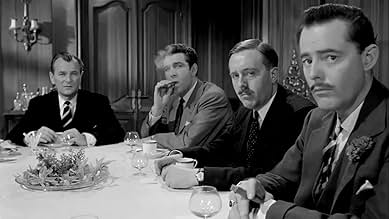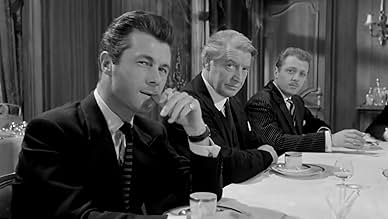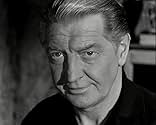CALIFICACIÓN DE IMDb
7.2/10
5.6 k
TU CALIFICACIÓN
Agrega una trama en tu idiomaA disgruntled veteran recruits a group of disgraced colleagues to perform a bank robbery with military precision.A disgruntled veteran recruits a group of disgraced colleagues to perform a bank robbery with military precision.A disgruntled veteran recruits a group of disgraced colleagues to perform a bank robbery with military precision.
- Nominada a1 premio BAFTA
- 1 premio ganado y 1 nominación en total
John Adams
- Police Constable in Final Scene
- (sin créditos)
- Dirección
- Guionistas
- Todo el elenco y el equipo
- Producción, taquilla y más en IMDbPro
Opiniones destacadas
Jack Hawkins, excellent as always, heads a superb cast in this marvelously entertaining look at the moral decay of Britain's upper classes in the post-war period. Some of Britain's greatest film talent was at work on this project, including screenwriter Bryan Forbes, director Basil Dearden, and cinematographer Arthur Ibbetson. If you want to see the granddaddy of caper films, this is it. It's also your chance to see Oliver Reed playing a flaming queen: believe it or not!
An enjoyable effort in the Ealing vein, more specifically in the black comic vein of "Kind Hearts and Coronets" or "The Naked Truth", with fairly upper-class individuals gleefully straying from the straight and narrow. It is a mark of the film's whimsical success that one is made to sympathise with what is basically a gang of upper-class soldiers resorting to criminality. The wit, camaraderie and very subtle pathos of the ex-soldiers is very well worked - adrift as they are in peacetime, the planned heist provides some scope for their talents.
Most of the actors make their mark in some way - Roger Livesey, Nigel Patrick and particularly Jack Hawkins, are wonderful. Robert Coote is wonderfully spot-on in his late appearance as Brigadier Bunny Warren.
The script is finely crafted and while not up to the standard of "Kind Hearts...", this is quite a fine little film, always mildly winning in some way throughout its duration. Rating:- ****/*****
Most of the actors make their mark in some way - Roger Livesey, Nigel Patrick and particularly Jack Hawkins, are wonderful. Robert Coote is wonderfully spot-on in his late appearance as Brigadier Bunny Warren.
The script is finely crafted and while not up to the standard of "Kind Hearts...", this is quite a fine little film, always mildly winning in some way throughout its duration. Rating:- ****/*****
9sol-
This is a heist film that really rises above the ante of its genre, due to the motivations behind the main characters. The characters are all former army officers, who were dismissed due to misconduct on their behalf, with the exception of the mastermind behind the robbery, who brings them all together. His name is Hyde, and he was halfway to becoming a full colonel before the army forced him into retirement. He is separated from his wife, and without army life, he has nothing left to do. So for the fun of it, rather than the money, he organises a heist.
The acting in the film is superb. The expressions that Jack Hawkins uses when playing Hyde signify that he is in it for the thrills rather than the loot. He looks on with joy, rather than stern, careful consideration, as he and his men organise everything that they need to do. He is in power again, since he is the head of the operation, and since he knows that everyone who he picks will want to go along. All of his men are not only crooks but ones with financial problems. And as the only one with plenty of money and no criminal record, he enjoys the idea that he can duck out at any time.
The supporting actors also show in the end that they are enjoying their work. While initially in it for the money, the return to army regulations - by which Hyde runs the operation - excites them. Nigel Patrick and Bryan Forbes are particularly good as the more suave members of the heist team. One problem though is that we never get to know the characters really well. They are defined by what we are told about them, rather than their actions, particularly with the Padre, played by Roger Livesey. A former quartermaster, he shows excitement at being able to take up the job again, but he is given very limited screen time, and his involvement with acts unbefiting a priest is oft mentioned, but his personality rarely shows anything more than that he is just another one of the men.
I find it rather odd that the film is marketed as a comedy. There is one section, when they raid the army, that is bouncing with humorous touches, and Gerald Harper, as a nervous army captain, gives off an excellent performance. The rest of the film though only has the slightest edge of humour, from Hyde badmouthing his wife to a rather awkwardly inserted cameo by Oliver Reed as a homosexual performer. The comedy is not important though, and the plot is intriguing enough as it is, but it does make the raiding the army section stand out, as it jars the film's mood and style.
If not flawless, it is still a very well made film. The rousing, grand music score is excellent, not just because it fits well over the action, but because it is sort of a parody of the scores of old war movies. The film looks great in black and white, and some of the sequences are very well shot. One example that stands out in memory is a shot where the camera goes through the walls of two different rooms, crabbing to the right, and swooping a little bit, almost like a person trying to not bump into a vase as he passes through a wall. The visual look of the film and the audio are just excellent, and well suited to the interesting screenplay.
The acting in the film is superb. The expressions that Jack Hawkins uses when playing Hyde signify that he is in it for the thrills rather than the loot. He looks on with joy, rather than stern, careful consideration, as he and his men organise everything that they need to do. He is in power again, since he is the head of the operation, and since he knows that everyone who he picks will want to go along. All of his men are not only crooks but ones with financial problems. And as the only one with plenty of money and no criminal record, he enjoys the idea that he can duck out at any time.
The supporting actors also show in the end that they are enjoying their work. While initially in it for the money, the return to army regulations - by which Hyde runs the operation - excites them. Nigel Patrick and Bryan Forbes are particularly good as the more suave members of the heist team. One problem though is that we never get to know the characters really well. They are defined by what we are told about them, rather than their actions, particularly with the Padre, played by Roger Livesey. A former quartermaster, he shows excitement at being able to take up the job again, but he is given very limited screen time, and his involvement with acts unbefiting a priest is oft mentioned, but his personality rarely shows anything more than that he is just another one of the men.
I find it rather odd that the film is marketed as a comedy. There is one section, when they raid the army, that is bouncing with humorous touches, and Gerald Harper, as a nervous army captain, gives off an excellent performance. The rest of the film though only has the slightest edge of humour, from Hyde badmouthing his wife to a rather awkwardly inserted cameo by Oliver Reed as a homosexual performer. The comedy is not important though, and the plot is intriguing enough as it is, but it does make the raiding the army section stand out, as it jars the film's mood and style.
If not flawless, it is still a very well made film. The rousing, grand music score is excellent, not just because it fits well over the action, but because it is sort of a parody of the scores of old war movies. The film looks great in black and white, and some of the sequences are very well shot. One example that stands out in memory is a shot where the camera goes through the walls of two different rooms, crabbing to the right, and swooping a little bit, almost like a person trying to not bump into a vase as he passes through a wall. The visual look of the film and the audio are just excellent, and well suited to the interesting screenplay.
This film apparently inspired the British comic troupe "The League Of Gentlemen".
I'm not surprised.
The film was directed by the popularly underrated Basil Dearden and starred the equally underrated Jack Hawkins.
What a shame they're so underrated!
The cast were brilliantly chosen and the plot is inspired. It would probably be impossible to remake this film acceptably well - it is very much of it's time.
Nigel Patrick will tell you, old darling, that you should watch this film with warmth and humour - the way it was made.
I'm not surprised.
The film was directed by the popularly underrated Basil Dearden and starred the equally underrated Jack Hawkins.
What a shame they're so underrated!
The cast were brilliantly chosen and the plot is inspired. It would probably be impossible to remake this film acceptably well - it is very much of it's time.
Nigel Patrick will tell you, old darling, that you should watch this film with warmth and humour - the way it was made.
A British army colonel, pensioned off and embittered, assembles a motley group of specialist, criminal and deviant ex-officers who share his bitterness. He has in mind a bank robbery. They arm themselves, courtesy of their former employer, then execute the robbery impeccably, right in the centre of the City of London. The bags of loot are filled, but, at the pictures, crime seldom pays....
That this film has been reviewed as a comedy demonstrates, once again, that British and American are two cultures disguised by a common language. The humour here, of that characteristically British sardonic kind, is incidental to a drama of frustration, disappointment and inadequacy. The humour is just the way the British speak.
The clever and low key "raid" on the army training centre is finely done. So much so that it overshadows the robbery itself and therefore slightly unbalances the action.
This is one of those films, craftsmanlike and enjoyable, yet not desperately exciting, that finds its greatest value precisely in being a period piece. The League of Gentleman is a fascinating social document. Made in 1959, it catches the moment in British history when, as its Empire dissolved, the social infrastructure that supported it and that had made Colonel Hyde what he had been, also disintegrated. This aspect could almost have been deliberate, explaining the very long opening sequence (another unbalancing factor) that introduces us to the seven main characters. There are shockingly frank moments: the honourable man with the overtly promiscuous wife; the gigolo; the religious fraudster (or pervert - the message is obscured); another of the heroes an "other man", a homosexual; the pressure of life in a small house with a loud television set. So, too, the casualness with which machine guns are used in a robbery by men trained in the code of gentlemen. The dull and seedy presentation of Hyde's home and base, large but far from grand, is further evidence of the decline of his class. So, too, a robbery that was intended as a hymn to the effectiveness of military planning, brought to naught by one stupid mistake and a small boy.
Yet this is not a sententious film, their is no preaching, none of that British nostalgia for the old ways, but almost a respect for the robbers and a recognition that life had to become more ruthless as a stiff society began to flex. How it was elsewhere, I do not know, but this watchable film will show anyone what was happening in Britain just before the Sixties began to swing.
That this film has been reviewed as a comedy demonstrates, once again, that British and American are two cultures disguised by a common language. The humour here, of that characteristically British sardonic kind, is incidental to a drama of frustration, disappointment and inadequacy. The humour is just the way the British speak.
The clever and low key "raid" on the army training centre is finely done. So much so that it overshadows the robbery itself and therefore slightly unbalances the action.
This is one of those films, craftsmanlike and enjoyable, yet not desperately exciting, that finds its greatest value precisely in being a period piece. The League of Gentleman is a fascinating social document. Made in 1959, it catches the moment in British history when, as its Empire dissolved, the social infrastructure that supported it and that had made Colonel Hyde what he had been, also disintegrated. This aspect could almost have been deliberate, explaining the very long opening sequence (another unbalancing factor) that introduces us to the seven main characters. There are shockingly frank moments: the honourable man with the overtly promiscuous wife; the gigolo; the religious fraudster (or pervert - the message is obscured); another of the heroes an "other man", a homosexual; the pressure of life in a small house with a loud television set. So, too, the casualness with which machine guns are used in a robbery by men trained in the code of gentlemen. The dull and seedy presentation of Hyde's home and base, large but far from grand, is further evidence of the decline of his class. So, too, a robbery that was intended as a hymn to the effectiveness of military planning, brought to naught by one stupid mistake and a small boy.
Yet this is not a sententious film, their is no preaching, none of that British nostalgia for the old ways, but almost a respect for the robbers and a recognition that life had to become more ruthless as a stiff society began to flex. How it was elsewhere, I do not know, but this watchable film will show anyone what was happening in Britain just before the Sixties began to swing.
¿Sabías que…?
- TriviaJack Hawkins was ill with cancer during filming. Shooting was shut down for several days.
- ErroresAs Col. Hyde is showing the movie of the exterior of the bank that they will rob he tells his cohorts, "This is the view of the bank that you will see three weeks from today, gentlemen." Sure enough, during the events just before the actual robbery: As the guard opens the rear door of the armored truck, the same-dressed man with a newspaper in his overcoat pocket walks past and, as the guards put the boxes on the flatbed truck, the same two women in light overcoats walk past.
- Citas
Major Race: Is that your wife?
Lt. Col. Hyde: Yes.
Major Race: Is she dead?
Lt. Col. Hyde: No, no. I regret to say the bitch is still going strong.
- ConexionesFeatured in Un plan brillante (2007)
Selecciones populares
Inicia sesión para calificar y agrega a la lista de videos para obtener recomendaciones personalizadas
Detalles
- Fecha de lanzamiento
- País de origen
- Idioma
- También se conoce como
- The League of Gentlemen
- Locaciones de filmación
- Productora
- Ver más créditos de la compañía en IMDbPro
Taquilla
- Presupuesto
- GBP 192,000 (estimado)
- Tiempo de ejecución
- 1h 56min(116 min)
- Color
- Mezcla de sonido
- Relación de aspecto
- 1.66 : 1
Contribuir a esta página
Sugiere una edición o agrega el contenido que falta






















